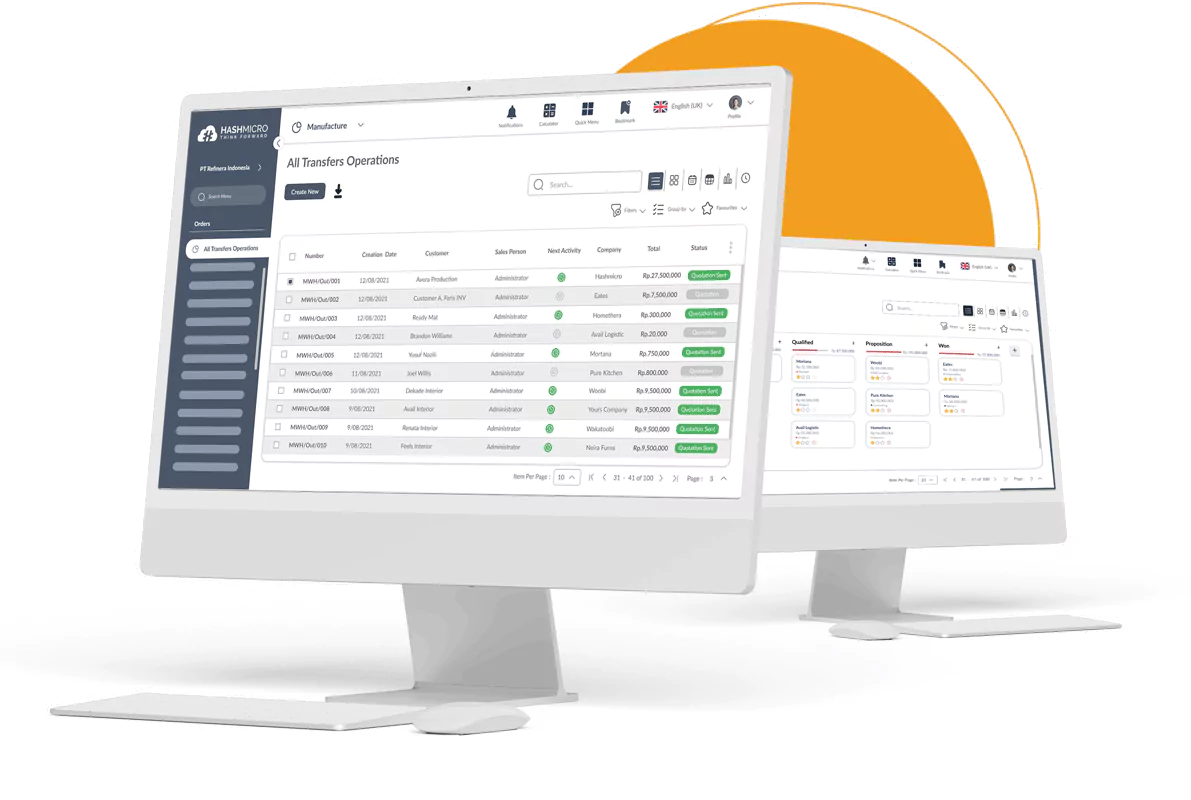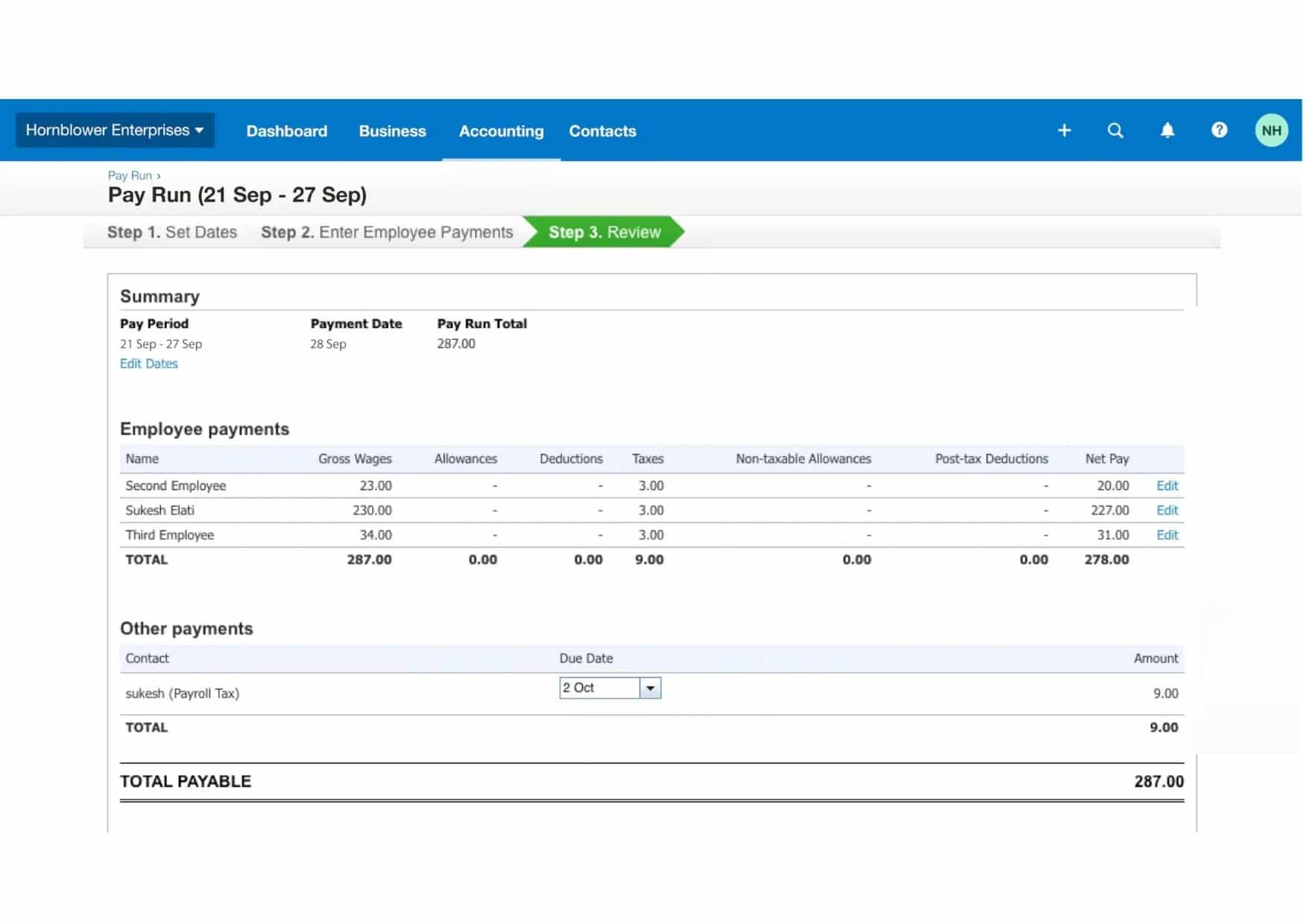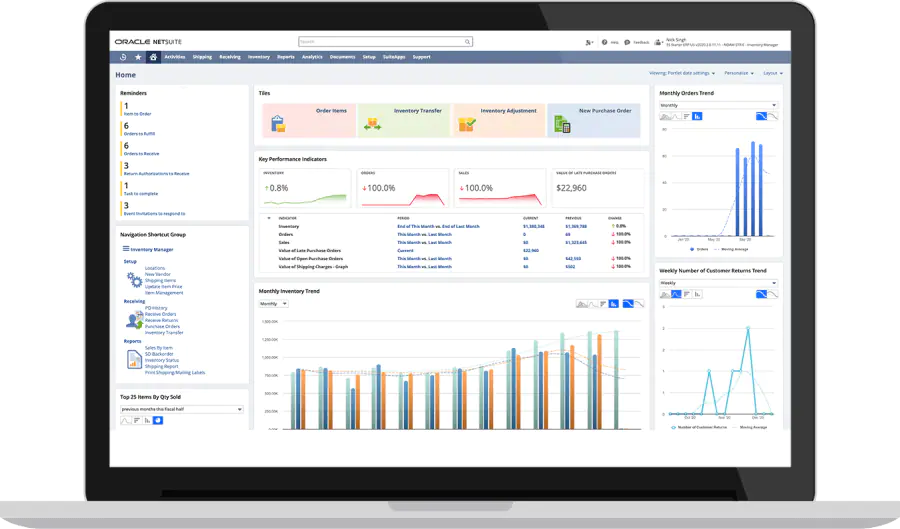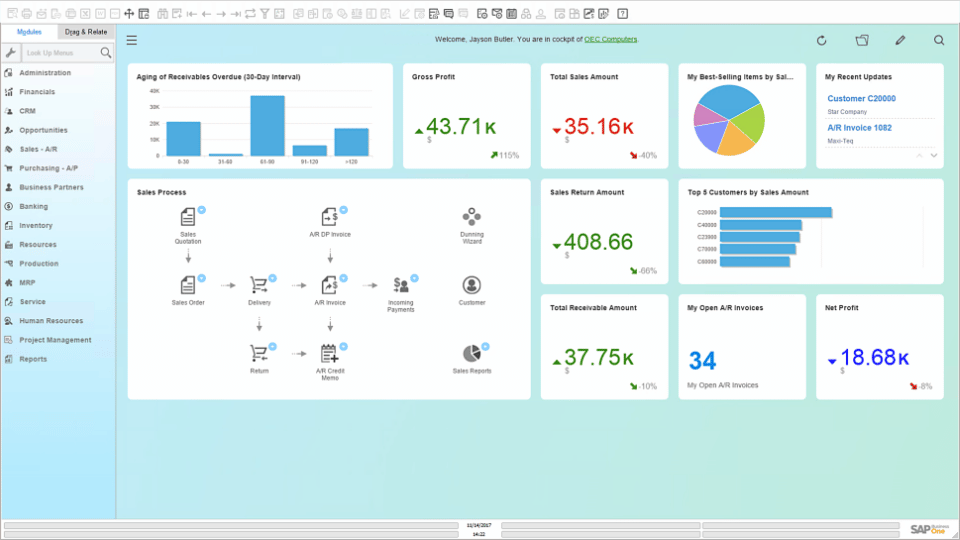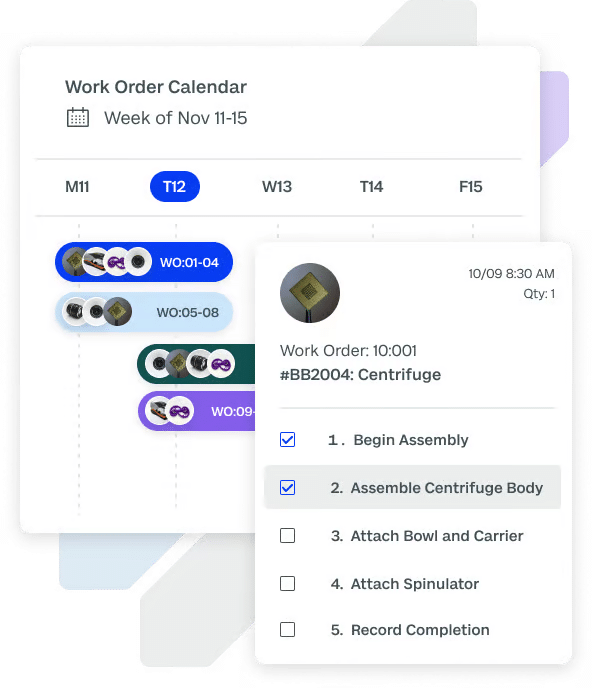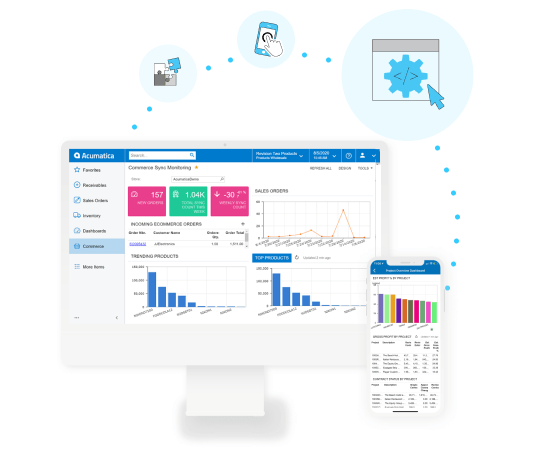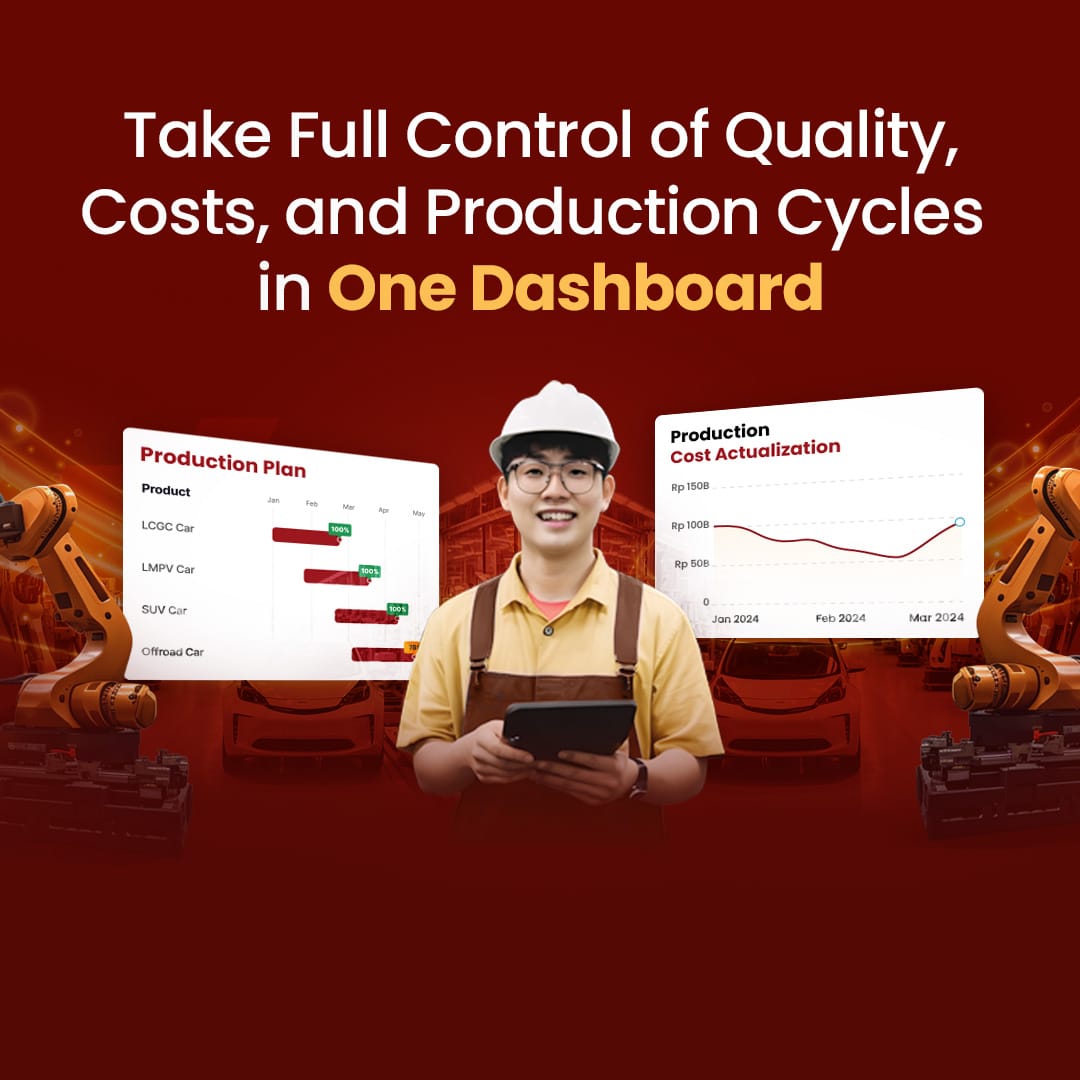Cloud manufacturing software is a digital solution that integrates and manages all aspects of production using cloud-based technology. By centralizing data and processes, it allows real-time collaboration and decision-making, enhancing efficiency and scalability for Singaporean businesses.
Being game-changing, 54% of manufacturing businesses plan to spend 10% or more on software by 2024. With that said, in terms of efficiency and speed using manufacturing technology, your business might be falling behind.
For Singapore businesses, adopting the best cloud based manufacturing software is crucial for streamlining operations. That is why, this article delves into the top modern manufacturing software tailored for the unique needs of Singaporean manufacturers.
Discover how these cloud manufacturing software can transform your manufacturing processes, optimize resource management, and provide real-time insights to stay ahead in today’s competitive market.
Key Takeaways
|
Table of Content:
Table of Content

What is Cloud Manufacturing ERP Software?
Cloud manufacturing ERP software is a digital tool that helps Singaporean businesses manage their production processes, including planning, inventory, and quality control. It centralizes data and processes which enhances efficiency and scalability.
Cloud manufacturing ERP (Enterprise Resource Planning) software represents a significant shift from traditional on-premise ERP solutions, offering a more flexible, scalable, and cost-effective approach to managing manufacturing processes.
Cloud ERP is hosted on the vendor’s servers and accessed through the internet, which leads to substantial cost savings and reduced complexity by its accounting software for manufacturing companies.
The importance and advantages of cloud manufacturing ERP software for businesses are manifold. It provides real-time data and analytics, which are crucial for informed decision-making and efficient management of manufacturing operations.
Key Features of Cloud Manufacturing Software
- Bill of Materials (BOM): This feature allows businesses to create comprehensive lists of raw materials, components, and instructions required for the production process.
- Work Order Management: Work order management is crucial for scheduling, assigning, and tracking manufacturing tasks. It enables efficient planning of production activities.
- Production Record: This feature keeps a detailed record of all production activities, including the quantities produced, the time taken for production, and the usage of materials.
- Quality Control: Quality control in cloud ERP systems helps businesses maintain high-quality standards in their production processes. It involves tracking defects, managing quality checks, and ensuring compliance with industry standards.
- Manufacturing Report and Analytics: This powerful feature helps identify trends, monitor key performance indicators (KPIs), and make data-driven decisions to improve efficiency and productivity.
Also read: 16 Best ERP Software in Singapore You Should Know in 2024
Best Cloud Manufacturing Software for Manufacturing Businesses
Manufacturing software implementation is becoming easier as technology progresses and training modules become available. Several manufacturing companies invest in the best ERP systems Singapore to assist their company in expanding.
Here are a few examples of the best manufacturing software from Singapore vendors:
1. HashMicro Cloud Manufacturing Software
HashMicro is one of Singapore’s leading Cloud ERP Software, assisting many large and small enterprises with their day-to-day operations. This company offers an excellent cloud manufacturing software system that has been trusted since 2015.
With more than 1750 customers, HashMicro is committed to being the best in automation solutions in Southeast Asia. They also offer a free demo of the system every day to entrepreneurs in Singapore, giving you more options to see how the system works before buying it.
The manufacturing system by HashMicro simplifies all of your work in your manufacturing company for fast and accurate results with an up-to-date system. Some of HashMicro’s best features are quality control and repair tracking in a timely and complete manner, automatic scheduling to track all of your activities and production processes, and cost control to reduce production costs.
Additional features in HashMicro Cloud Manufacturing software are warehouse management, inventory management, accounting software for manufacturing companies, and CRM. HashMicro helps the company manage all key financial aspects, including expenses and revenue, providing a real-time picture of business performance.
With this tool, the company can rest assured there will be team spirit among employees, and they can all collectively work from one central source of finance, revenues, as well as customer data.
| Pros | Cons |
| ✓ Unlimited user with no additional cost. | × Some companies may require training and adaptation to access complex features. |
| ✓ Access anytime and anywhere without requiring an internet connection. | × Not very suitable for small-scale businesses. |
| ✓ Free demo is available for prospective clients who want to try the system first. | × It takes time to schedule a free demo, considering the long queue. |
| ✓ Have many comprehensive modules that can be customized to the company’s needs. | |
| ✓ User-friendly and intuitive interface, accessible for all users. | |
| ✓ Capability for in-depth automatic analysis and reporting. |
Discover how HashMicro Cloud Based Manufacturing Software can transform your business operations by requesting a free demo. You can also click here to explore its pricing options and find the perfect plan tailored to your needs.
2. Xero
Xero is a cloud-based ERP for small businesses in the manufacturing industry that includes tools to help you manage your bookkeeping more efficiently and accurately. Because Xero is cloud-based accounting software, you can access it at any time, including on tablets and mobile devices, via an app, eliminating the need for multiple backups.
Xero also provides quick access to a variety of reports, allowing you to maintain an up-to-date view of your company’s financial condition at any time.
| Pros | Cons |
| ✓ The ability to connect with various ERP systems facilitates the integration of data and existing business processes. | × Although it supports many popular ERP systems, there’s a possibility that Xero may not yet support or may require special configuration for certain business systems. |
| ✓ User-friendly design. | × For those who are not familiar with this type of software, it might take time to understand all its features fully. |
| ✓ Automates time-consuming and often error-prone processes such as forecasting and stock optimization. |
3. Sage
Sage Business Cloud Manufacturing Software is a prominent manufacturing accounting software that was developed to assist businesses in staying on top of their manufacturing activities and managing them properly.
Moreover, it provides users with a comprehensive view of everything from sourcing and scheduling to financials, inventories, manufacturing costs, and sales. This technology is especially appropriate for mid-sized businesses and enterprises, particularly those with multiple locations and companies.
Its built-in industry-specific solution optimizes manufacturing and distribution processes for improved operational efficiency.
| Pros | Cons |
| ✓ Can be customized to meet unique business needs. | × Implementing the system can be expensive, including costs for licenses, consultancy, and employee training. |
| ✓ The ability to integrate with various other systems in the company’s business ecosystem. | × There are limitations in integrating with other applications outside the Infor ecosystem. |
| ✓ Real-time and accurate inventory monitoring. | × Too large and complex for small or simple companies. |
| ✓ Provides robust analytics and reporting tools for better decision-making. |
4. Netsuite Cloud Manufacturing Software
Netsuite Cloud Manufacturing Software is a cloud-based manufacturing management system designed for businesses. Alongside inventory management, it handles production and manufacturing progress, generating reports for easy tracking.
The data is securely stored in the cloud, accessible from any location with an internet connection through their Windows application or mobile app on iOS and Android devices. Catering to manufacturing businesses of various scales, Netsuite Cloud Manufacturing Software provides a practical solution.
| Pros | Cons |
| ✓ The feature specifications can be customized according to the characteristics and complexity of the company. | × Implementing NetSuite can be expensive, including licensing fees, consulting fees, and employee training costs. |
| ✓ Suitable for small to large companies with complex processes. | × Implementing the system often requires a significant amount of time. |
| ✓ Strong integration with various other business modules, including finance, sales, and manufacturing. | × Internet connection disruptions can result in system unavailability. |
| ✓ Provides robust scalability, enabling businesses to grow without needing to switch systems. |
5. Epicor
Epicor is an ERP solution specifically tailored for the manufacturing industry. Their cloud-based systems are designed to enhance productivity and efficiency across various manufacturing processes.
Epicor’s advanced ERP system offers features like real-time data analytics, comprehensive inventory management, production scheduling, and quality control. It also integrates seamlessly with various third-party applications to ensure a cohesive operational environment.
| Pros | Cons |
| ✓ Highly customizable | × Requires extensive training |
| ✓ Strong customer support | × Can be complex for new users |
| ✓ Excellent integration capabilities | × Implementation can be time-consuming |
| ✓ Robust analytics tools | |
| ✓ Scalable for growing businesses |
6. Infor CloudSuite Industrial (SyteLine)
Infor offers CloudSuite Industrial (SyteLine), a cloud-based ERP solution aimed at manufacturers. Known for its innovative approach, Infor focuses on providing software that delivers greater operational efficiency and improved visibility across the supply chain.
For cloud-based manufacturing software, it includes advanced planning and scheduling, real-time data insights, and comprehensive financial management. It also offers tools for quality control, supply chain management, and customer relationship management.
| Pros | Cons |
| ✓ User-friendly interface | × Can be expensive to customize |
| ✓ Strong integration with other Infor products | × Limited mobile app features |
| ✓ Excellent customer support | × May require third-party add-ons |
| ✓ Reliable system updates | |
| ✓ Scalable for large enterprises |
7. Microsoft Dynamics 365
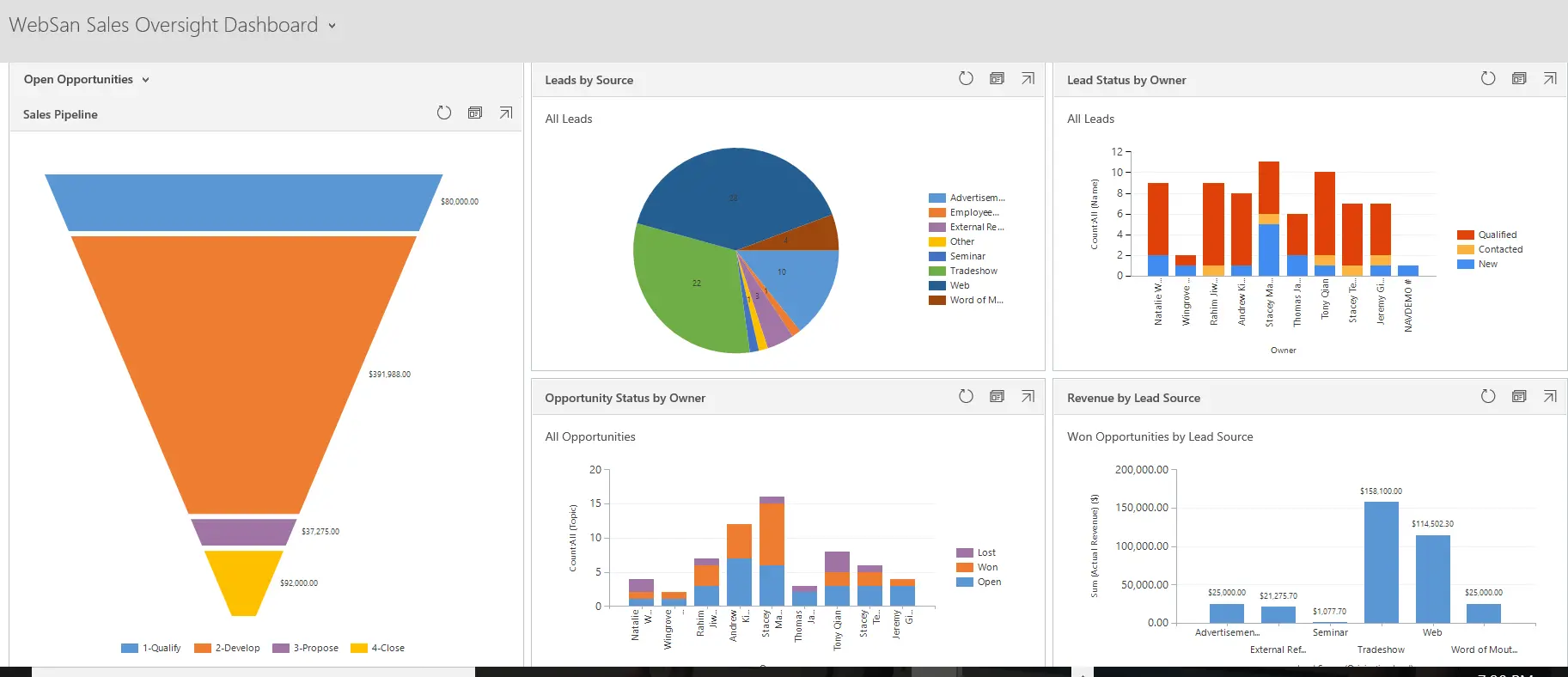
Dynamics 365 offers a unified interface for managing finances, operations, sales, and customer service. Its AI-driven insights, real-time analytics, and seamless integration with other Microsoft products make it a powerful tool for manufacturers.
| Pros | Cons |
| ✓ Seamless integration with Microsoft products | × Can be complex to implement |
| ✓ AI-driven insights for better decision-making | × Requires ongoing maintenance |
| ✓ Real-time analytics and reporting | × Higher cost for advanced features |
| ✓ Scalable and flexible for businesses of any size | |
| ✓ Comprehensive CRM and ERP capabilities |
8. Odoo Cloud-Based Manufacturing ERP Software
Odoo is an open-source ERP solution that offers a suite of business applications. Known for its flexibility and modular approach, Odoo allows businesses to tailor their ERP systems to their specific needs, making it a popular choice among manufacturers.
Odoo’s manufacturing module includes features for managing production, inventory, and quality control. It also supports real-time data tracking, automated workflows, and seamless integration with other business applications. Learn more about Odoo ERP in our in-depth Odoo review article.
| Pros | Cons |
| ✓ Highly customizable | × Requires technical expertise |
| ✓ Open-source flexibility | × Limited built-in support |
| ✓ Strong community support | × Can be complex for new users |
| ✓ Modular design allows scaling | |
| ✓ Cost-effective for small businesses |
9. SYSPRO
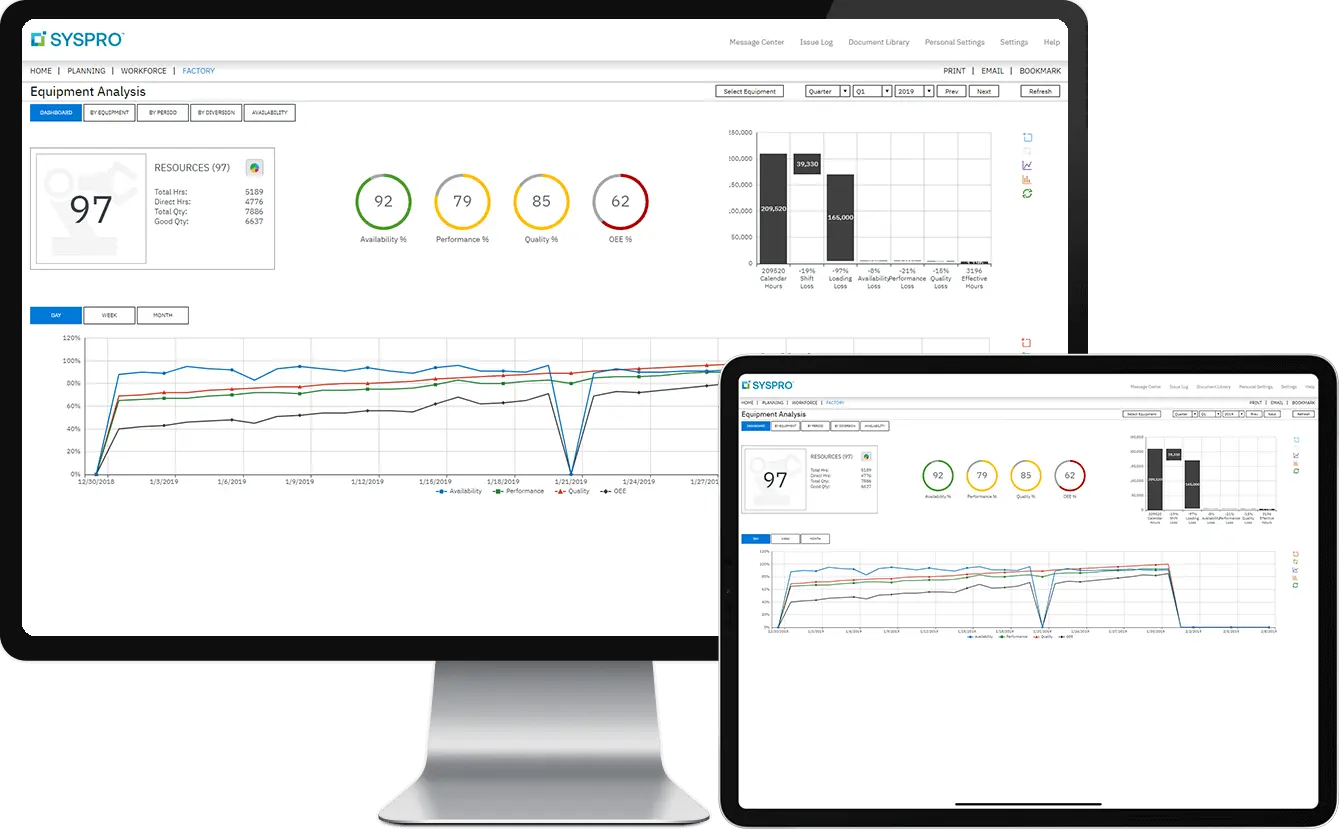
SYSPRO includes features for production planning, inventory management, quality control, and financial management. It also offers real-time data insights, strong integration capabilities, and a user-friendly interface.
| Pros | Cons |
| ✓ Reliable customer support | × Requires extensive training |
| ✓ User-friendly interface | × Can be complex to customize |
| ✓ Strong integration capabilities | × Higher initial investment |
| ✓ Real-time data insights for better decision-making | |
| ✓ Flexible and scalable for various industries |
10. SAP Business One
SAP Business One Cloud for Manufacturing is an Enterprise Resource Planning (ERP) solution specifically designed for small and medium-sized manufacturing businesses. It also combines manufacturing management capabilities with the flexibility and scalability of cloud computing.
As a cloud-based solution, SAP Business One Cloud requires a stable internet connection. If the internet goes down, it may hinder access to critical business information and disrupt operations.
| Pros | Cons |
| ✓ Highly scalable for enterprises of all sizes | × Complex system for new users |
| ✓ Comprehensive suite of features covering various business processes | × Expensive implementation costs |
| ✓ Strong integration capabilities with third-party systems | × Dependence on the vendor for updates and support |
| ✓ Real-time data processing and analytics | |
| ✓ Reliable and secure for large-scale operations |
11. Fishbowl
Fishbowl is an cloud based manufacturing erp software primarily tailored for small and medium-sized businesses utilizing Quickbooks. It operates on the cloud, making it an efficient asset-tracking tool for managing assets, goods, and stockpiles.
This seamless integration between Fishbowl and Quickbooks ensures shared information, which results in a comprehensive and precise overview of your company’s storage status.
| Pros | Cons |
| ✓ Can be customized to meet unique business needs. | × Implementing the system can be expensive, including costs for licensing, consulting, and employee training. |
| ✓ Ability to integrate with various other systems within the company’s business ecosystem. | × Has limitations in integrating with applications outside the Fishbowl ecosystem. |
| ✓ Real-time and accurate inventory monitoring. | × Too large and complex for small or simple companies. |
12. Acumatica
Acumatica is an ERP manufacturing software available both on-premise and as a cloud-based solution. It offers modules for financial management, customer management, project accounting, field services, commerce, business intelligence, and manufacturing management. This software is designed for SMEs seeking an integrated tool.
Acumatica cloud based manufacturing erp software provides essential functionalities for accounting, customer information visualization, project accounting, field services dispatching, and commerce consistency.
| Pros | Cons |
| ✓ Offers features that encompass supply chain management | × Limited customization options |
| ✓ Can be integrated with other software | × New individuals require training to learn the system |
| ✓ User-friendly interface | × Frequent issues with customer service |
| ✓ Cloud-based for easy access anytime, anywhere | |
| ✓ Scalable solution suitable for growing businesses |
13. Rootstock
Rootstock, established in 2008, is a cloud ERP provider focused on the manufacturing and distribution sectors. Built on the Salesforce platform, Rootstock offers robust ERP solutions designed to enhance operational efficiency and visibility across the supply chain.
Rootstock cloud based manufacturing erp software includes features such as production management, inventory control, quality assurance, and supply chain management. It also offers powerful analytics and reporting tools, seamless Salesforce integration, and real-time data access.
| Pros | Cons |
| ✓ Real-time data access | × Can be expensive for small businesses |
| ✓ Strong integration capabilities | × Requires Salesforce subscription |
| ✓ Robust quality assurance | × Can be complex to implement |
| ✓ Comprehensive analytics tools | |
| ✓ Scalable for growing manufacturing needs |
14. IQMS (Dassault Systèmes)
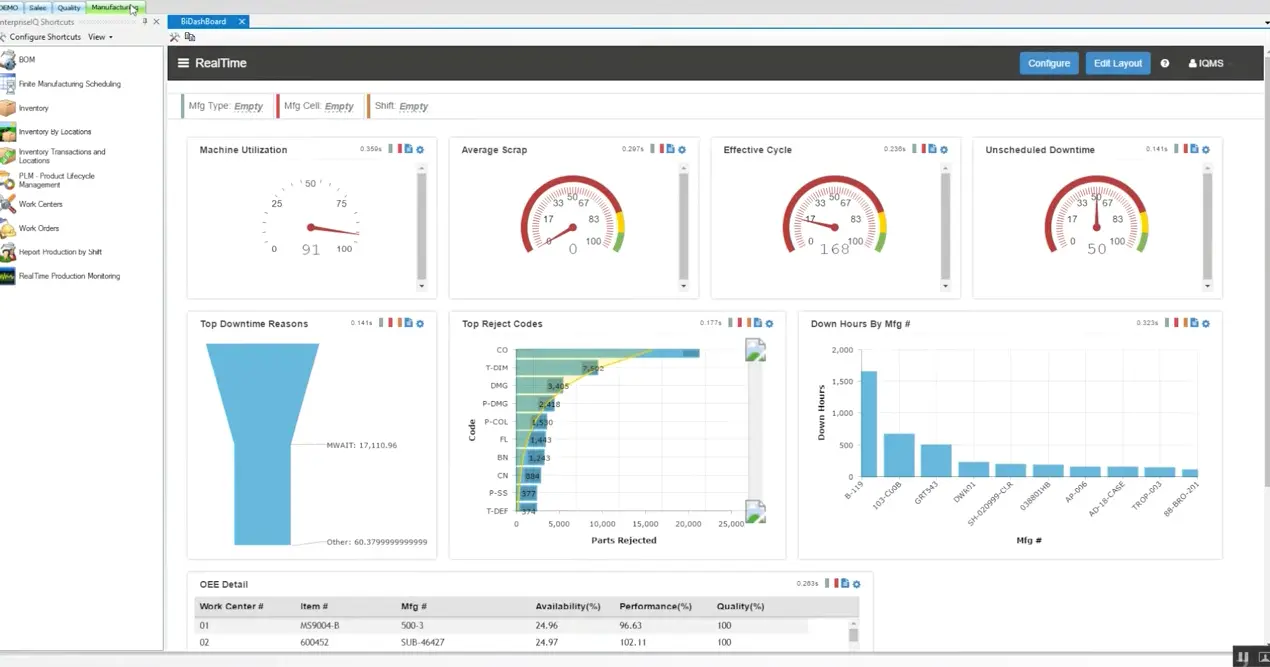
IQMS includes modules for production management, inventory control, quality assurance, and supply chain management. It also provides robust analytics and reporting tools to support informed decision-making.
| Pros | Cons |
| ✓ Reliable performance | × Can be costly to implement |
| ✓ Robust analytics tools for data-driven decisions | × Requires ongoing maintenance |
| ✓ Good customer support | × Steep learning curve |
| ✓ Comprehensive manufacturing features | |
| ✓ Scalable for medium to large businesses |
15. Plex Systems
Established in 1995, Plex offers a cloud-based manufacturing ERP known as the Plex Manufacturing Cloud. Plex Manufacturing Cloud includes features like production management, inventory control, quality management, and supply chain analytics.
| Pros | Cons |
| ✓ Reliable customer support | × Can be expensive for smaller businesses |
| ✓ Real-time data access for better decision-making | × Requires extensive training |
| ✓ Strong reporting and analytics tools | × Limited customization options |
| ✓ Excellent supply chain visibility | |
| ✓ Cloud-based platform for easy accessibility |
Tips How to Choose The Right Cloud Manufacturing Software
Choosing the right cloud-manufacturing ERP software for your business is a critical decision that can significantly impact your operational efficiency and bottom line. Here are some tips to help you make the best choice:
- Assess Your Business Needs: Consider factors like the size of your company, the complexity of your manufacturing processes, and your future growth plans. Identify the key features you need, such as inventory management, production scheduling, or quality control.
- Scalability: Choose software that can grow with your business. It should be able to handle an increase in production volume, more complex manufacturing processes, and additional users without a drop in performance.
- Integration Capabilities: The software should easily integrate with your existing systems, such as ERP, CRM, or accounting software. Seamless integration ensures smooth data flow and reduces the risk of data silos.
- User-Friendly Interface: Look for a cloud-based manufacturing ERP software with an intuitive and easy-to-navigate interface. A user-friendly system reduces training time and helps your team adapt more quickly.
- Customization and Flexibility: Every business is unique, and so are its needs. Opt for software that allows customization to fit your specific manufacturing processes and workflows.
- Security and Reliability: Given the cloud-based nature of the software, ensure that it has robust security measures in place to protect your data. Also, check the provider’s track record for system reliability and uptime.
- Cost-Effectiveness: Consider the total cost of ownership, including subscription fees, implementation costs, training, and any additional charges for support or updates. Compare this against the expected ROI.
- Vendor Reputation and Support: Research the vendor’s reputation in the market. Read customer reviews and case studies. Also, assess the level and quality of customer support they offer, including training, troubleshooting, and regular updates.
- Compliance and Regulatory Standards: Ensure that the software complies with industry standards and regulations, especially if you operate in a highly regulated sector.
- Demo or Trial Version: Before making a final decision, use a demo or trial version of the software. This will give you a hands-on feel for how the software works and whether it meets your expectations.
Remember, the right cloud manufacturing software should not only meet your current needs but also be capable of adapting to future challenges and changes in the manufacturing landscape.
Conclusion
You understand what a manufacturing business is and why it can be different from other business industries. Knowing about cloud manufacturing software and the benefits of using manufacturing software for small businesses can help your business grow.
Before selecting one of the best cloud-manufacturing ERP software in Singapore, you should analyze the type of your business and what features or manufacturing demands would best suit your needs. This manufacturing software will help your business to grow and allow you to cut costs and have a system that isn’t too complex for your company’s needs.
HashMicro manufacturing software offers you comprehensive ERP features that will help you in progressing your production. It also offers a free demo service, try it now!
FAQ About Cloud Manufacturing Software
-
What are the 5 types of software used in manufacturing?
– Enterprise Resource Planning (ERP) Software.
– Product Lifecycle Management (PLM) Software.
– Supply Chain Management (SCM) Software.
– Human Resources Management System (HRMS) Software.
– Internet of Things (IoT) for Manufacturing. -
What does manufacturing cloud do?
Manufacturing Cloud is essentially a specialized CRM solution designed for the manufacturing sector. It enables manufacturers to effectively manage customer interactions and oversee the entire customer service lifecycle with ease.
-
What is the future of cloud manufacturing?
Integrating a Manufacturing Execution System (MES) with cloud computing offers real-time insight into operations, allowing manufacturers to monitor and manage production processes more accurately. This leads to better product quality, reduced waste, and enhanced manufacturing efficiency.





